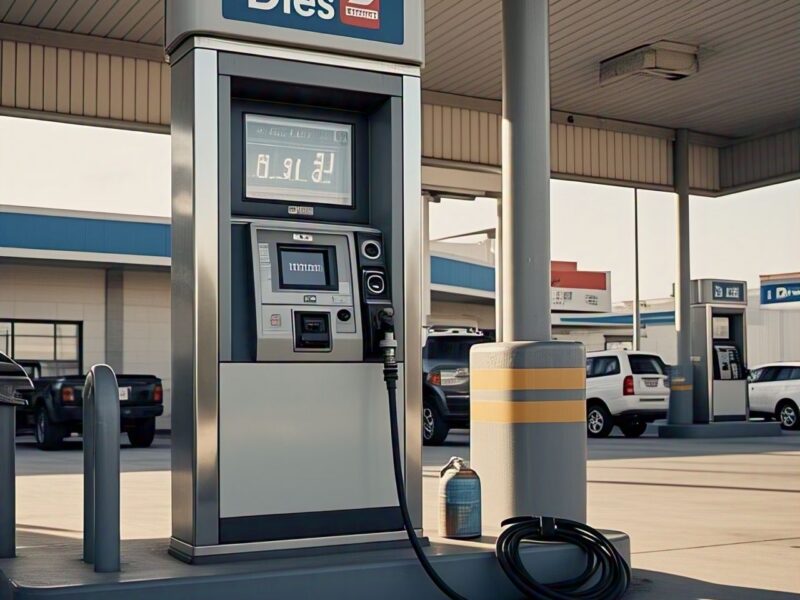Wondering how much is a litre of diesel in Nigeria? As of March 28, 2025, the price of a litre of diesel in Nigeria ranges from ₦900 to ₦1,500, depending on the source—official pump prices, black market rates, or regional variations. Diesel powers everything from trucks to generators in Nigeria, making its cost a key concern. We’re here to provide a detailed, engaging guide with current pricing, influencing factors, and practical insights to help you navigate Nigeria’s fuel market. Let’s dive into the details.
Table of Contents
ToggleWhy Diesel Prices Matter in Nigeria
Diesel is a lifeline for Nigeria’s economy, fueling transportation, industries, and backup power amid unreliable electricity. With no fully operational local refineries until recently, prices hinge on imports and, now, emerging local supply from Dangote Refinery. Posts on X and web data as of March 2025 show a shifting landscape—let’s explore what’s driving the cost of a litre of diesel today.
Current Diesel Prices in Nigeria
Here’s the latest on diesel prices as of March 28, 2025, based on available data and sentiment from X posts:
- NNPC Pump Price: Around ₦900 per litre—the official rate from Nigerian National Petroleum Company (NNPC) stations, per web sources like bestsales.ng (March 10, 2025).
- Average Market Price: ₦1,100 to ₦1,240—reflecting filling station averages across states, with sources like Deroll Synergy and GlobalPetrolPrices.com citing ₦1,200 and ₦1,023.60 respectively.
- Black Market Rate: Up to ₦1,500 per litre—noted in posts on X and web reports (e.g., maypatronic.com, January 2025), common during scarcity or in remote areas.
- Dangote Refinery Impact: Recent X posts (March 17, 2025) report Dangote cutting ex-gantry prices to ₦870 per litre, potentially lowering pump prices to ₦1,000-₦1,100 in some areas.
Prices vary by location—Lagos and Abuja often see lower rates (₦1,100-₦1,200) than northern or rural zones (₦1,300+).
Read also how-much-is-petrol-in-nigeria-current-prices-and-market-trends-in-2025
Where to Buy Diesel in Nigeria
You’ve got options for sourcing diesel:
- NNPC Stations: Official price around ₦900—reliable but often crowded.
- Filling Stations: Major brands like Total or independent stations sell at ₦1,100-₦1,240—widely available.
- Black Market: ₦1,300-₦1,500—risky, unregulated, but a fallback in shortages; common in markets like Lagos’ Oshodi.
- Depots: NNPC or private depots offer bulk rates (e.g., ₦900 per web data), ideal for businesses.
- Online/Delivery: Firms like Deroll Synergy quote ₦1,200—convenient for Abuja or urban buyers.
Check local stations or platforms like Jiji.ng for real-time deals.
What Drives Diesel Prices?
Several factors shape the cost of a litre of diesel in Nigeria:
- Global Oil Prices: Crude fluctuations impact import costs—diesel tracks Brent crude trends.
- Naira Exchange Rate: At ₦1,543/USD (X posts, March 2025), a weaker Naira hikes import expenses.
- Dangote Refinery: Local production at ₦870 ex-gantry (X, March 17, 2025) aims to cut reliance on imports.
- Distribution Costs: Transport from ports or refineries to rural areas adds ₦100-₦200 per litre.
- Black Market Dynamics: Scarcity and forex shortages push informal rates to ₦1,500.
These elements create a volatile price range.
Regional Price Differences
Diesel costs vary across Nigeria:
- Lagos: ₦1,100-₦1,200—near ports, competitive supply.
- Abuja: ₦1,200 (Deroll Synergy, September 2024)—stable but slightly higher.
- North (e.g., Kano): ₦1,211-₦1,300—transport costs inflate prices.
- South-South: ₦1,100-₦1,150—closer to depots, lower logistics fees.
Rural areas often pay a premium due to distance.
Diesel vs. Other Fuels in Nigeria
How does diesel stack up?
- Petrol (PMS): ₦831-₦950 per litre (GlobalPetrolPrices.com, March 2025)—cheaper but less efficient for heavy use.
- Kerosene: ₦1,300+—pricier, less common for power.
- CNG: Emerging alternative, but infrastructure lags—costs unclear.
Diesel remains king for industrial and generator use.
Tips for Getting the Best Diesel Price
Stretch your Naira with these strategies:
- Buy in Bulk: Depots or trusted suppliers offer rates like ₦900-₦1,000.
- Track Dangote Impact: Look for stations reflecting the ₦870 ex-gantry drop.
- Avoid Black Market Peaks: Wait out scarcity if possible—rates hit ₦1,500 then.
- Compare Locally: Check Jumia or X posts for regional deals.
- Time Purchases: Post-festive lulls (e.g., after Eid) may dip prices.
Read also How Much Is a Small Generator in Nigeria?
Impact of Diesel Costs on Nigerians
A litre at ₦1,200 ripples through life:
- Transport: Higher fares as trucks and buses pass on costs.
- Goods: Production expenses raise prices of essentials like bread.
- Power: Generator users face ₦5,000+ daily—a burden with no grid relief.
Dangote’s lower rates could ease this strain if distribution scales.
Is Diesel Still Worth It?
At ₦900-₦1,500, diesel’s value depends on use. For businesses or heavy-duty needs, it’s cost-effective versus alternatives. Home users might weigh CNG or solar as prices climb. It’s a practical choice, but economics dictate planning.
Final Word on Diesel Prices
So, how much is a litre of diesel in Nigeria? From ₦900 at NNPC pumps to ₦1,500 on the black market, it’s a range tied to supply, location, and policy. With Dangote Refinery shaking things up, prices may stabilize near ₦1,000-₦1,200. This guide equips you to buy smart—will you stock up now or watch the trend?

